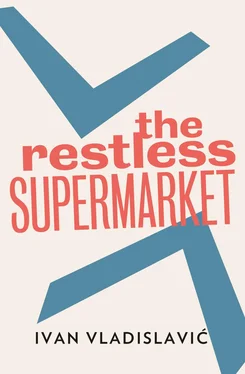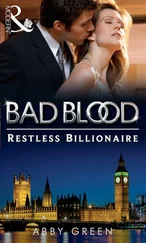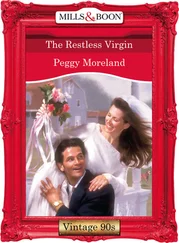As I’ve said, I was on comfortably proper terms with Mrs Mavrokordatos, although our relationship was not without its personal touches. She had begun to take in the Star , for instance, and kept it behind the counter in its own binder so that I should have first crack at it. But with Spilkin she behaved differently, almost as if she were his housekeeper or, their ages notwithstanding, his mother. She was always plying him with complimentary titbits — Italian kisses (as I believe they’re called), almond-flavoured amaretti sprinkled with angelica, oily dolmades, little tumblers of resinous retsina.
Once I said to her: ‘You should charge him rent for that chair.’
And he piped up: ‘She should pay me for sitting here. Thanks to me, she can say in all honesty that this place is never empty.’ There were always people coming and going, men mainly, clustering around tables where card games were in progress, drifting off into corners for quieter conversations, talking over their shoulders to ‘contacts’ at the next table, hailing newcomers by sending up smoke signals from their cigars. The recent arrivals from abroad spoke more loudly than the others, and offered cigarettes from garishly coloured packets, which were inhaled like the fair weather of home. Those who were leaving looked distant and bored, and wore too much gold jewellery. They came and they went. But Spilkin was a fixture.
‘There are limits — or there should be,’ I said. ‘No offence, Mrs Mavrokordatos, you know how fond I am of this establishment, but I’m beginning to think that Spilkin here is an extremist, beneath his moderate exterior.’
I resisted the urge to follow his example, to seek out company earlier in the day, to pop in at all hours. I have never been the sort of person who pops in anywhere. I could no more pop in than I could knock about or toddle along. It’s not my way. I disciplined myself to leave my flat no earlier than three in the afternoon and to return at a decent hour. Routine is the foundation of happiness. A proofreader needs a clear head and a sharp eye. All my life it had been lights out at ten on the dot, and I saw no reason to make rash changes now. My routine gave me more than enough time for doing the crossword, reading the newspaper, writing the odd letter to the editor, conversing with my friend, and of course working on my System of Records, the meaty main course for which all these other activities were mere appetizers. In this way, several satisfying months went by.
Spilkin was a ladies’ man. Did I mind, he enquired one day, if Mevrouw Bonsma joined us, just this once?
‘Mevrouw’ because it did not seem right to call her ‘Bonsma’, in accordance with our usual practice — the house style, as I thought of it — and because Spilkin had got it into his head that she was Dutch. He said he could not look at her without being reminded of poffertjes (which turned out to be sugar-coated fritters, much eaten in the Low Countries). For my part, I found that she put me in mind of windswept dykes and wheels of cheese. But I went along with his suggestion. I am not easily swayed, but I was perhaps a little too much under his influence at the time.
‘Tell us about Rotterdam,’ said Spilkin, ‘and your triumphs as a soloist with the Philharmonic.’
Mevrouw Bonsma disengaged her long teeth with a click and patted his arm with a hand as red and square as a stevedore’s (it is with pianists as it is with surgeons and cardsharps). ‘You know very well, Spilkijn,’ — he had introduced himself thus and she seemed to think it was a diminutive — ‘that I was born and bred in Rustenburg.’ Despite all her efforts to modulate it and make it lilt, her voice hissed and crackled like an old gramophone record.
‘A lady of your accomplishments? Impossible.’
‘I am just a farm girl at heart. Sincerely, I have never even been in an aeroplane.’
‘Mevrouw!’ Pursing his lips, giving the exotic diphthong the shape of a grape, then swallowing it whole like a tickled schoolboy. If he made ‘Mevrouw Bonsma’ sound as sweet and juicy as a fruit, she made ‘Spilkin’ into an acute little instrument for winkling the stubborn flesh from its shell. Bodkin, kilderkin, cannikin, sooterkin. Was it my imagination or was there a trace of a Dutch accent like a dusting of cinnamon on her flat vowels? Perhaps she was putting it on, under suggestion.
The banter continued while she powdered her face. Pancake, she explained, for the lights. Light, actually: a sixty-watt globe in a bluebell shade, dipping its head over the keyboard. ‘Once an artiste, always an artiste. But I have no illusions, life has stripped me of them, one by one. People used to sit up and take notice when I played. Now I am ‘‘background music’’, that’s all.’ The skin of her neck had the texture of crêpe. She enamelled her lips and went bravely back to work.
‘So, what do you think?’
I had had the opportunity to examine Mevrouw Bonsma closely over the months, but I had not drawn many conclusions from the exercise. She was highly strung, but that was fitting. And she thought too much about what other people thought of her. Taking pride in one’s appearance is nothing less than good manners, but she was overly concerned with trifles. An occupational hazard, perhaps. While one of her raw-boned hands bickered away at the keys, the other was always wandering to the nape of her neck, fumbling for a label, checking whether her jersey was on the right way round. I saw that she did not have the feet of a pianist either. Her big plates of meat, tilted on the wineglass heels of slippers made of silver chain-mail, pumped the pedals, while her hands rolled over the keys, setting up a pale vibrato in the flesh of her upper arms. She looked like a navvy driving some shiny piece of earth-moving equipment. Five-letter word: spade. Or: piano. Incongruously, the music itself was a soft, insistent outpouring, like drizzle on the roof, or the tinkling of a wind-chime, to which one grows so accustomed, one only hears it when it falls silent. ‘A charming woman.’
‘You like her?’
‘Well enough.’ I did too, although we were not friends as such. There was something heroic in her efforts to be light, to keep her bulk afloat on such a thin stream of sound. Her fingertips touched the keys with exquisite delicacy, defying gravity, skipping like a flurry of raindrops across the surface of a pond, producing ever more intricate Venn diagrams of interlocking ripples.
Spilkin and I sat up straighter than usual, while she paddled through ‘Swanee River’.
‘Her name,’ Spilkin whispered, ‘is Suzanna, but I promised not to tell. She enjoys being Mevrouwed. Bit of a snob, never mind the country-girl stuff.’
Total snob, in reverse, to a degree (6). National serviceman in a boa (6). New edition of Bosman (6).
When she rolled without missing a beat into ‘Red Sails in the Sunset’, we gave her a round of applause, which found a few polite echoes at the other tables — or it may have been draughtsmen clacking over their foes. She showed us her grateful yellowed ivories.
‘Just this once’ was no more than a manner of speaking. Mevrouw Bonsma acquired a permanent place at our table. She would join us between shifts at the piano, to moisten her throat with the mug of tea or rock shandy to which her contract entitled her. She laughed voraciously at Spilkin’s jokes, as if she were crushing rusks between her molars, and left fading echoes of her laughing mouth on the rim of her teacup and the ends of her satin-tipped cigarettes.
Once had been a tolerable novelty; but being in her company constantly aggravated me. The sheer bulk of her was an imposition. When she sat down at the table, I felt myself rise momentarily in my own chair, as if the room had subsided in her vicinity. She loomed over us like a dam wall, which had seemed sturdy enough when observed from a safe distance, but appeared to be crumbling away now that we squatted, like a pair of truant schoolboys, in the damp shade at its foot. I felt as if I was on the shores of Mevrouw Bonsma . The phrase rang in my head, trying to fit itself to the tune of ‘Loch Lomond’ or ‘On Top of Old Smokey’, without success. Always, it was Rotterdam I saw. Such a watery fecundity! What if she burst? I would be washed away like a stick of balsa on a flood of evergreens. Even when she went back to the piano, the threat remained. She had elbowed her way out of the background to which she belonged, and could no longer be ignored. When she played, we had to listen. Her personal favourites bubbled along perkily, flats tumbling like little propellers, sharps concealed like lures in soft lumps of melody. The special requests, hauled up from the abysmal deeps, could be positively sodden. More than once I felt as if I was drowning.
Читать дальше












